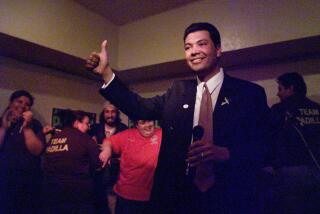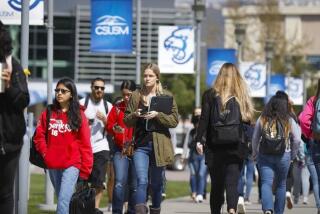CSUN Opens Display of Former Rep. Corman’s Documents
- Share via
A portion of the voluminous files of former Rep. James C. Corman, who represented the San Fernando Valley for 20 years, is open to the public at Cal State Northridge--providing a window into the workings of Congress and residents’ concerns during two often-turbulent decades.
At ceremonies Monday announcing the documents’ availability, CSUN officials hailed Corman’s papers as a valuable source of first-hand material on the nitty-gritty of government, as well as watershed events between 1960 and 1980. They said the once-influential liberal Democrat’s files are one of the university’s largest collections of original research documents.
“The most interesting part is the constituent files,” said Tom Reilly, director of CSUN’s Urban Archives Center, which is processing Corman’s files. “It expresses the views of the people in the Valley over a 20-year period,” including their feelings about former President Richard M. Nixon, taxes and the gasoline shortages of the late 1970s.
Corman, 68, has been a Washington lobbyist since he was narrowly defeated by former Rep. Bobbi Fiedler in 1980. During Monday’s events, he and university officials familiar with the collection said the thousands of documents contain no personal or political bombshells.
Corman donated more than 300 large packing cartons--the equivalent of 500 linear feet--containing hundreds of thousands of memoranda, legislative notes, documents, speeches, newsletters, constituent letters, photographs and videotapes to CSUN in 1981.
In the years since, CSUN officials have raised $25,000 in donations for the laborious project of cataloguing one-fourth of the files, which took two years to complete, Reilly said. He estimated that it would take another $50,000 to $55,000 and three to five years before the rest of the collection would be available to the public.
Corman’s papers span two decades that saw the first manned flight to the moon, the Civil Rights Movement, the Vietnam War, the landmark national study that followed the 1967 urban race riots, the Watergate impeachment hearings of Nixon, and battles over major welfare and tax legislation.
“While in office, he was affected by some of the most significant events and changes in recent American history,” said the printed program for Monday’s ceremonies. “Exceptionally interesting are the records of the National Advisory Commission on Civil Disorders.”
The commission was created by then-President Lyndon B. Johnson in the aftermath of rioting that erupted nationwide in the summer of 1967. Corman was one of 10 members of the panel headed by Illinois Gov. Otto Kerner. Corman’s 11 boxes of Kerner Commission files include hearing testimony, news stories, correspondence and the commission’s reports.
The silver-haired Corman said Monday that his major accomplishment was his role in passing the 1964 Civil Rights Act, which outlawed racial, religious and other forms of discrimination, and set in motion school desegregation nationwide.
It was a combination of the desegregation issue and President Jimmy Carter’s landslide defeat to Ronald Reagan that led to Fiedler’s upset of Corman in 1980. She was a leader of the forces opposing mandatory school busing for desegregation in the Valley.
More to Read
Sign up for Essential California
The most important California stories and recommendations in your inbox every morning.
You may occasionally receive promotional content from the Los Angeles Times.













